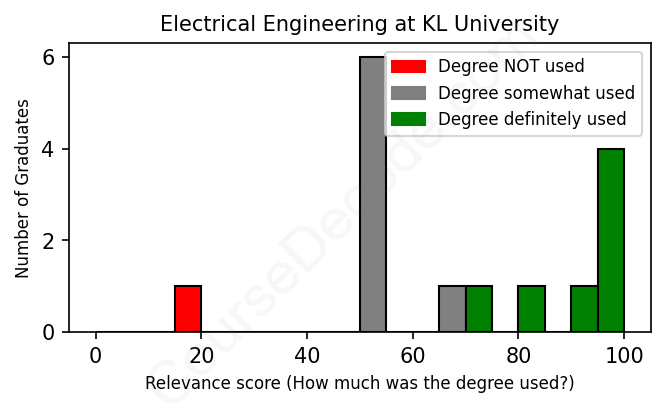
First, some facts. Of the Electrical Engineering graduates from KL University we've analyzed , here's how many have used (or NOT used) their degree in their career:

These are estimates based on AI analysis of 15 LinkedIn profiles (see below).
The verdict? Slightly above average. Overall, with an average relevance score of 68%, Electrical Engineering graduates from KL University have a slightly higher likelihood (+1%) of finding work in this field compared to the average graduate across all fields:
And for comparison, here's the chart for all profiles we've looked at across all degrees.
Also, after graduating, 80% of these graduates have pursued further education other than another Bachelor's degree (such as a Masters degree or other), compared to the average across all profiles of 35%. This suggests you may need more than just a Bachelors degree to be competitive as a Electrical Engineering graduate.
See the details:
|
Relevance score: 50% We think this person has gone into a career only somewhat relevant to their degree. We think this person has gone into a career only somewhat relevant to their degree.
DEGREE INFOGraduated in 2020 from KL University with a Bachelor of Technology in Electrical Engineering. No other secondary education since. JOB HISTORY SINCE GRADUATIONAssistant System Engineer Tata Consultancy Services Feb 2021 - Jul 2022 ABOUTNo information provided. |
The top 10 most common jobs done by the graduates we've analyzed (ranked most common to least) are:
Here is a visual representation of the most common words in job titles for Electrical Engineering graduates (this is across all Electrical Engineering graduates we've analyzed, not just those who went to KL University):

Based on the LinkedIn profiles of graduates from KL University, it seems that many alumni have ventured into a range of careers, with a strong emphasis on tech-related fields. For their first jobs, many of these graduates have taken positions in the software development and engineering realm, such as software engineers, quality assurance engineers, and systems engineers. It’s not uncommon for recent graduates to start in roles like DevOps, which relate closely to both software and systems engineering. This initial trend suggests that KL University graduates leverage their technical skills effectively right out of school, landing jobs that, while not always directly tied to traditional electrical engineering roles, still fall under the broader umbrella of technology and engineering.
Fast forward five or ten years down the line, and these individuals often find themselves advancing within the tech industry. It's notable that many have transitioned into leadership roles or specialized engineering positions, reflecting a solid career trajectory built on their foundational education in electrical engineering. For instance, we see graduates moving up to senior roles, such as senior software engineers or technology analysts, which indicates a capacity for growth within their fields. However, a portion of them has also drifted towards roles that, while related, aren't strictly within electrical engineering, like web development or automation testing. Overall, the picture is quite positive: while not every graduate remains directly in electrical engineering, many successfully build solid careers in technology, which is a valuable space in today's job market.
Honestly, a Bachelor’s degree in Electrical Engineering can be pretty challenging, and KL University is no exception. You’ll find yourself diving into a lot of complex math and science concepts, like calculus, circuits, and signals, which can definitely be tough if those subjects aren’t your strong suit. The coursework tends to be rigorous, with plenty of projects and labs that require a solid understanding of the theory. That said, if you enjoy problem-solving and have a genuine interest in how things work, it can also be super rewarding. Just be ready to put in the time and effort, but don't worry—you’ll have plenty of support along the way!
Most commonly, in the LinkedIn profiles we've looked at, it takes people 4 years to finish a Bachelor degree in Electrical Engineering.
From what I've gathered, it seems like the Electrical Engineering grads from KL University have generally done well for themselves in the job market, especially in tech-heavy areas like DevOps and software engineering. A lot of them have climbed the ladder fairly quickly, moving from roles like developer and engineer to higher positions, which usually means better pay. Companies like Apple and Intel often pay a premium for talent, too, so if they've landed jobs there, chances are they’re making decent money. Overall, while entry-level salaries can be pretty average, it looks like many of these graduates have stepped into roles that likely come with solid compensation over time.
Here is a visual representation of the most common words seen in the "about" section of LinkedIn profiles who have a Bachelor degree in Electrical Engineering (this is across all Electrical Engineering graduates we've analyzed, not just those who went to KL University). This may or may not be useful:

Here are all colleges offering a Bachelor degree in Electrical Engineering (ordered by the average relevance score of their Electrical Engineering graduates, best to worst) where we have analyzed at least 10 of their graduates: